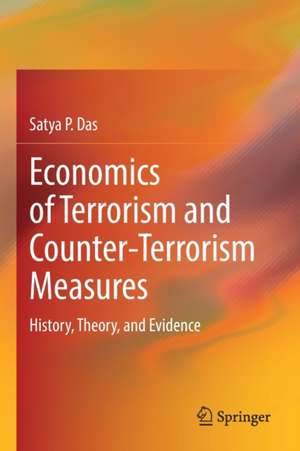Economics of Terrorism and Counter-Terrorism Measures: History, Theory, and Evidence
Autor Satya P. Dasen Limba Engleză Paperback – 21 iul 2023
Some chapters discuss in depth the empirical results in the literature as well as the underlying statistical/econometric methodologies that go beyond ordinary regression. General Appendix A provides an exposition of the concept of compensating surplus and elements of the basic game theory, to help the reader with an economics background recapitulate micro theory concepts used in the book. General Appendix B lays out the notions of hypothesis testing, regression and more advanced statistical/econometric methods, so that the reader understands or at least can have an intuitive idea of how the results are derived and what they mean with some degree of inner comfort.
Aimed at students at the intermediate undergraduate and graduate levels, the text requires knowledge of basic micro, first-order conditions of profit or utility maximization and cost minimization, and statistical concepts of hypothesis testing and regression. This textbook is intended for use in courses in economics, political science, criminal justice, and emergency management. Additionally, professionals working with national security in government and non-governmental organizations may find it useful.
| Toate formatele și edițiile | Preț | Express |
|---|---|---|
| Paperback (1) | 608.48 lei 6-8 săpt. | |
| Springer International Publishing – 21 iul 2023 | 608.48 lei 6-8 săpt. | |
| Hardback (1) | 698.34 lei 3-5 săpt. | +48.13 lei 4-10 zile |
| Springer International Publishing – 20 iul 2022 | 698.34 lei 3-5 săpt. | +48.13 lei 4-10 zile |
Preț: 608.48 lei
Preț vechi: 715.86 lei
-15% Nou
Puncte Express: 913
Preț estimativ în valută:
116.45€ • 121.12$ • 96.13£
116.45€ • 121.12$ • 96.13£
Carte tipărită la comandă
Livrare economică 14-28 aprilie
Preluare comenzi: 021 569.72.76
Specificații
ISBN-13: 9783030965792
ISBN-10: 3030965791
Pagini: 701
Ilustrații: XXV, 701 p. 193 illus., 148 illus. in color.
Dimensiuni: 155 x 235 mm
Greutate: 1.1 kg
Ediția:1st ed. 2022
Editura: Springer International Publishing
Colecția Springer
Locul publicării:Cham, Switzerland
ISBN-10: 3030965791
Pagini: 701
Ilustrații: XXV, 701 p. 193 illus., 148 illus. in color.
Dimensiuni: 155 x 235 mm
Greutate: 1.1 kg
Ediția:1st ed. 2022
Editura: Springer International Publishing
Colecția Springer
Locul publicării:Cham, Switzerland
Cuprins
1. Introduction.- 2. Origin, Objective and History of Terrorism and Terrorist Organizations.- 3. Tracking Terror: Trends and Patterns.- 4. Cost of Organizing, and, Financing of Terror.- 5. Economic Costs of Terrorism and Costs of Counter-Terrorism Measures.- 6. Economic and Health Effects of Terrorism.- 7. Behavior, Internal Organization and Survival of Terror Groups.- 8. Security.- 9. Preemptive Strikes, CanWe Win the War on Terror?.- 10. Combating Financing of Terror.- 11. Security-Deterrence ‘and’ Preemptive Measures.- 12. Hostage-Taking, Ransom and Negotiations.- 13. Combining Preventive Measures with Preemptive Measures.- 14. Religious Orthodoxy and Terrorism.- 15. Root, Breeding and Propagative Causes of Terrorism.
Notă biografică
Satya P. Das is the founding editor of the journal Indian Growth and Development Review and has taught at the University of Wisconsin-Milwaukee, Indiana University-Bloomington, Indian Statistical Institute – Delhi Centre and University of Illinois at Urbana-Champaign. His research interests include the economics of terrorism and conflict, international trade, and growth and development with particular emphasis on the service sector.
Textul de pe ultima copertă
This textbook presents a systematic study of terrorism from the standpoint of economic analysis. Choosing the kind and level of measures to counter terror is, to a large extent, an economic decision, as counterterrorism (CT) measures and their side effects are costly. This text, contains theoretical models that illustrate the economic mechanisms of different types of CT measures. A vast array of empirical studies and regularities are also presented.
Some chapters discuss in depth the empirical results in the literature as well as the underlying statistical/econometric methodologies that go beyond ordinary regression. General Appendix A provides an exposition of the concept of compensating surplus and elements of the basic game theory, to help the reader with an economics background recapitulate micro theory concepts used in the book. General Appendix B lays out the notions of hypothesis testing, regression and more advanced statistical/econometric methods, so thatthe reader understands or at least can have an intuitive idea of how the results are derived and what they mean with some degree of inner comfort.
Aimed at students at the intermediate undergraduate and graduate levels, the text requires knowledge of basic micro, first-order conditions of profit or utility maximization and cost minimization, and statistical concepts of hypothesis testing and regression. This textbook is intended for use in courses in economics, political science, criminal justice, and emergency management. Additionally, professionals working with national security in government and non-governmental organizations may find it useful.
Some chapters discuss in depth the empirical results in the literature as well as the underlying statistical/econometric methodologies that go beyond ordinary regression. General Appendix A provides an exposition of the concept of compensating surplus and elements of the basic game theory, to help the reader with an economics background recapitulate micro theory concepts used in the book. General Appendix B lays out the notions of hypothesis testing, regression and more advanced statistical/econometric methods, so thatthe reader understands or at least can have an intuitive idea of how the results are derived and what they mean with some degree of inner comfort.
Aimed at students at the intermediate undergraduate and graduate levels, the text requires knowledge of basic micro, first-order conditions of profit or utility maximization and cost minimization, and statistical concepts of hypothesis testing and regression. This textbook is intended for use in courses in economics, political science, criminal justice, and emergency management. Additionally, professionals working with national security in government and non-governmental organizations may find it useful.
Caracteristici
Presents a history of terrorism and major organizations around the world from the second half of the 19th century Presents a systematic cost-benefit theoretical analysis of counterterrorism measures Reviews empirical studies and findings on causes and effects of terrorism
